#climate change thriller
Explore tagged Tumblr posts
Text
The Descent by Paul E. Hardisty
Today I am sharing my review of the fabulous, and quite worrying, new climate change novel from Paul E. Hardisty, The Descent @paulhardisty @orendabooks @randomthingstours #books #thedescent #bookreview #bookstagram #booksofinstagram #climatechange
Today on jenmedsbookreviews.com (the only blog I publish this review on) I am delighted to share my thoughts on The Descent by Paul E. Hardisty, a prequel and sequel to The Forcing, his brilliant climate change thriller. I loved The Forcing, and this has been one of my most anticipated reads of 2024 ever since it was announced last year. My thanks to publisher, Orenda Books, for the early copy…

View On WordPress
0 notes
Text
Climate change, stupidity, and an ancient virus set the stage for a possible pandemic in this medical thriller.
#medical thriller#booktok disaster fiction#women's suspense#Booktok men's thriller#climate change thriller#bqb publishing
0 notes
Text
The way I cracked up reading "Mt. Fuji experiences its first snowless October in 130 years" as Michael Jackson belts, "This is the end of your life" into my ears. Holy shit, the misfortune of timing.

You hear the door slam And realize there's nowhere left to run You feel the cold hand And wonder if you'll ever see the sun
#music#lyrics#michael jackson#thriller#happy halloween#climate disaster#climate change#greatrunners meta#.gif warning
3 notes
·
View notes
Text

#grunge aesthetic#treephotography#rainyweather#rainforest#forest#trees#climate change#florest nature#rainyday#fogcore#cottagecore#grunge#thriller#aesthetic#clouds#cloudy
9 notes
·
View notes
Text
0 notes
Text
Book Review & Author Guest Post | Panic Peak by William Liggett (Warming World Adventures -1) A #CliFi #Thriller | @iReadBookTours @liggett1 @bill.liggett #Reviews #BookBloggers #Climate
Book Review & Author Guest Post | Panic Peak by William Liggett (Warming World Adventures) A #CliFi #Thriller | @iReadBookTours @liggett1 @bill.liggett #Reviews #BookBloggers #Climate #Giveaway How can a single glacier grow dramatically while hundreds are shrinking around the world? This paradox confronts a young glaciologist Kate Landry as she looks down at her research site buried under shocking mounds of new snow. Little does she know that Mount Olympus is in the bulls-eye for a sophisticated geoengineering experiment being conducted by a scientist who has convinced a secretive international oil cartel to fund his dubious climate modification techniques. While Kate struggles to understand why the glacier is growing and begins to unravel the entire nefarious scheme, she also struggles to avoid the unraveling of her developing relationship with social psychologist Grant Poole. The more Kate uncovers on the glacier, the more her own life is at risk. Can she expose the unethical and dangerous geoengineering operation without being caught before she’s stopped? And at what risk to her life? Enter #giveaway to win! #climate #climatechange #nature #environment #globalwarming #climatecrisis #climateaction #sustainability #earth #savetheplanet #sustainable #climatechangeisreal
Book Review & Author Guest Post | Panic Peak by William Liggett (Warming World Adventures) A #CliFi #Thriller | @iReadBookTours @liggett1 @bill.liggett #Reviews #BookBloggers #Climate #Giveaway A book blog tour from iRead Book Tours. Thank you to the author, publisher, & Lauren at iRead for providing me with the information for this tour. Quick Summary Panic Peak by William A. Liggett is an…
#2024 Book Reviews#book review#Books#Climate Change#Climate Thriller#iRead Book Tours#Warming World Adventures#William A. Liggett
0 notes
Text
Reap the Wind
Enjoy!
Happy Saturday! I am going to get back on a more consistent schedule of posting here shortly, but for now, just wanted to let you know that my friend, Joel Burcat has a new book out, Reap the Wind, now available on Amazon. Joel loves an environmental thriller and in this one, he tackles the issue of climate change. Give it a go. Here’s the synopsis: “Josh Goldberg is a young lawyer from a…

View On WordPress
0 notes
Text
Movie Review: How to Blow Up a Pipeline(2023)
Title: How to Blow Up a Pipeline Release Date: April 7, 2023 Director: Daniel Goldhaber Production Company: Chrono | Lyrical Media | Spacemaker Productions Summary/Review: How to Blow Up a Pipeline plays out like a heist movie as a group of young environmental activists plot to sabotage a crude oil pipeline in West Texas. They meet at an abandoned house in a remote area where they assemble the…

View On WordPress
1 note
·
View note
Text
Enjoy my quick review of the sci-fi thriller, LAST SENTINEL here and sub for daily videos.
#lastsentinel #review #katebosworth #lucienlaviscount #martinmccann #moviereview #drama #scifi #thriller #climatechange
#last sentinel#movies#film#climate change#kate bosworth#sci-fi#science fiction#thriller#drama#review
0 notes
Text
How to Blow Up a Pipeline (2023)
In Bertrand Bonello’s 2016 political provocation Nocturama, a group of young, hip domestic terrorists set off a disparate series of homemade bombs in modern Paris, then await the state’s violent military response in a shopping mall. In Daniel Goldhaber’s How to Blow Up a Pipeline, a group of young, hip domestic terrorists set off two homemade bombs along a Texan desert pipeline, then await the…

View On WordPress
#activism#Ariela Barar#brandon ledet#climate change#daniel garber#daniel goldhaber#how to blow up a pipeline#Jordan Sjol#reviews#thriller
1 note
·
View note
Text
The #Bookvent Calendar 2023: Day Eleven
My day 11 #bookvent choice is a climate themed thriller, a dystopian view of a world that seems improbably close to being a reality. @evecmsith @OrendaBooks #bookvent2023 #thebookventcalendar #teamorenda
#Bookvent – Celebrating my top reads of 2023 My eleventh #bookvent selection is by an author who never fails to deliver the chills, someone who takes a very plausible situation and amplifies the fears of the everyday until it becomes a thorough engrossing and thought provoking read. This latest offering is based in a not too distant future, where climate change has reached catastrophic levels,…

View On WordPress
#Bookvent 2023#Climate Change#Climate Thriller#Eve Smith#Orenda Books#Population Control#The Bookvent Calendara
0 notes
Text
Climate change, an ancient virus, and stupidity create a deadly situation.
0 notes
Text
Insurance companies are making climate risk worse
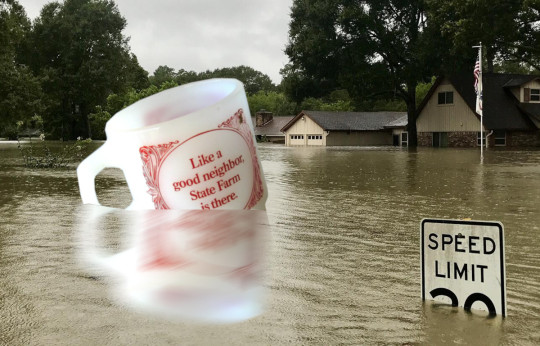
Tomorrow (November 29), I'm at NYC's Strand Books with my novel The Lost Cause, a solarpunk tale of hope and danger that Rebecca Solnit called "completely delightful."

Conservatives may deride the "reality-based community" as a drag on progress and commercial expansion, but even the most noxious pump-and-dump capitalism is supposed to remain tethered to reality by two unbreakable fetters: auditing and insurance:
https://en.wikipedia.org/wiki/Reality-based_community
No matter how much you value profit over ethics or human thriving, you still need honest books – even if you never show those books to the taxman or the marks. Even an outright scammer needs to know what's coming in and what's going out so they don't get caught in a liquidity trap (that is, "broke"), or overleveraged ("broke," again) exposed to market changes (you guessed it: "broke").
Unfortunately for capitalism, auditing is on its deathbed. The market is sewn up by the wildly corrupt and conflicted Big Four accounting firms that are the very definition of too big to fail/too big to jail. They keep cooking books on behalf of management to the detriment of investors. These double-entry fabrications conceal rot in giant, structurally important firms until they implode spectacularly and suddenly, leaving workers, suppliers, customers and investors in a state of utter higgeldy-piggeldy:
https://pluralistic.net/2022/11/29/great-andersens-ghost/#mene-mene-bezzle
In helping corporations defraud institutional investors, auditors are facilitating mass scale millionaire-on-billionaire violence, and while that may seem like the kind of fight where you're happy to see either party lose, there are inevitably a lot of noncombatants in the blast radius. Since the Enron collapse, the entire accounting sector has turned to quicksand, which is a big deal, given that it's what industrial capitalism's foundations are anchored to. There's a reason my last novel was a thriller about forensic accounting and Big Tech:
https://us.macmillan.com/books/9781250865847/red-team-blues
But accounting isn't the only bedrock that's been reduced to slurry here in capitalism's end-times. The insurance sector is meant to be an unshakably rational enterprise, imposing discipline on the rest of the economy. Sure, your company can do something stupid and reckless, but the insurance bill will be stonking, sufficient to consume the expected additional profits.
But the crash of 2008 made it clear that the largest insurance companies in the world were capable of the same wishful thinking, motivated reasoning, and short-termism that they were supposed to prevent in every other business. Without AIG – one of the largest insurers in the world – there would have been no Great Financial Crisis. The company knowingly underwrote hundreds of billions of dollars in junk bonds dressed up as AAA debt, and required a $180b bailout.
Still, many of us have nursed an ember of hope that the insurance sector would spur Big Finance and its pocket governments into taking the climate emergency seriously. When rising seas and wildfires and zoonotic plagues and famines and rolling refugee crises make cities, businesses, and homes uninsurable risks, then insurers will stop writing policies and the doom will become undeniable. Money talks, bullshit walks.
But while insurers have begun to withdraw from the most climate-endangered places (or crank up premiums), the net effect is to decrease climate resilience and increase risk, creating a "climate risk doom loop" that Advait Arun lays out brilliantly for Phenomenal World:
https://www.phenomenalworld.org/analysis/the-doom-loop/
Part of the problem is political: as people move into high-risk areas (flood-prone coastal cities, fire-threatened urban-wildlife interfaces), politicians are pulling out all the stops to keep insurers from disinvesting in these high-risk zones. They're loosening insurance regs, subsidizing policies, and imposing "disaster risk fees" on everyone in the region.
But the insurance companies themselves are simply not responding aggressively enough to the rising risk. Climate risk is correlated, after all: when everyone in a region is at flood risk, then everyone will be making a claim on the insurance company when the waters come. The insurance trick of spreading risk only works if the risks to everyone in that spread aren't correlated.
Perversely, insurance companies are heavily invested in fossil fuel companies, these being reliable money-spinners where an insurer can park and grow your premiums, on the assumption that most of the people in the risk pool won't file claims at the same time. But those same fossil-fuel assets produce the very correlated risk that could bring down the whole system.
The system is in trouble. US claims from "natural disasters" are topping $100b/year – up from $4.6b in 2000. Home insurance premiums are up (21%!), but it's not enough, especially in drowning Florida and Texas (which is also both roasting and freezing):
https://grist.org/economics/as-climate-risks-mount-the-insurance-safety-net-is-collapsing/
Insurers who put premiums up to cover this new risk run into a paradox: the higher premiums get, the more risk-tolerant customers get. When flood insurance is cheap, lots of homeowners will stump up for it and create a big, uncorrelated risk-pool. When premiums skyrocket, the only people who buy flood policies are homeowners who are dead certain their house is gonna get flooded out and soon. Now you have a risk pool consisting solely of highly correlated, high risk homes. The technical term for this in the insurance trade is: "bad."
But it gets worse: people who decide not to buy policies as prices go up may be doing their own "motivated reasoning" and "mispricing their risk." That is, they may decide, "If I can't afford to move, and I can't afford to sell my house because it's in a flood-zone, and I can't afford insurance, I guess that means I'm going to live here and be uninsured and hope for the best."
This is also bad. The amount of uninsured losses from US climate disaster "dwarfs" insured losses:
https://www.reuters.com/business/environment/hurricanes-floods-bring-120-billion-insurance-losses-2022-2023-01-09/
Here's the doom-loop in a nutshell:
As carbon emissions continue to accumulate, more people are put at risk of climate disaster, while the damages from those disasters intensifies. Vulnerability will drive disinvestment, which in turn exacerbates vulnerability.
Also: the browner and poorer you are, the worse you have it: you are impacted "first and worst":
https://www.climaterealityproject.org/frontline-fenceline-communities
As Arun writes, "Tinkering with insurance markets will not solve their real issues—we must patch the gaping holes in the financial system itself." We have to end the loop that sees the poorest places least insured, and the loss of insurance leading to abandonment by people with money and agency, which zeroes out the budget for climate remediation and resiliency where it is most needed.
The insurance sector is part of the finance industry, and it is disinvesting in climate-endagered places and instead doubling down on its bets on fossil fuels. We can't rely on the insurance sector to discipline other industries by generating "price signals" about the true underlying climate risk. And insurance doesn't just invest in fossil fuels – they're also a major buyer of municipal and state bonds, which means they're part of the "bond vigilante" investors whose decisions constrain the ability of cities to raise and spend money for climate remediation.
When American cities, territories and regions can't float bonds, they historically get taken over and handed to an unelected "control board" who represents distant creditors, not citizens. This is especially true when the people who live in those places are Black or brown – think Puerto Rico or Detroit or Flint. These control board administrators make creditors whole by tearing the people apart.
This is the real doom loop: insurers pull out of poor places threatened by climate disasters. They invest in the fossil fuels that worsen those disasters. They join with bond vigilantes to force disinvestment from infrastructure maintenance and resiliency in those places. Then, the next climate disaster creates more uninsured losses. Lather, rinse, repeat.
Finance and insurance are betting heavily on climate risk modeling – not to avert this crisis, but to ensure that their finances remain intact though it. What's more, it won't work. As climate effects get bigger, they get less predictable – and harder to avoid. The point of insurance is spreading risk, not reducing it. We shouldn't and can't rely on insurance creating price-signals to reduce our climate risk.
But the climate doom-loop can be put in reverse – not by market spending, but by public spending. As Arun writes, we need to create "a global investment architecture that is safe for spending":
https://tanjasail.wordpress.com/2023/10/06/a-world-safe-for-spending/
Public investment in emissions reduction and resiliency can offset climate risk, by reducing future global warming and by making places better prepared to endure the weather and other events that are locked in by past emissions. A just transition will "loosen liquidity constraints on investment in communities made vulnerable by the financial system."
Austerity is a bad investment strategy. Failure to maintain and improve infrastructure doesn't just shift costs into the future, it increases those costs far in excess of any rational discount based on the time value of money. Public institutions should discipline markets, not the other way around. Don't give Wall Street a veto over our climate spending. A National Investment Authority could subordinate markets to human thriving:
https://democracyjournal.org/arguments/industrial-policy-requires-public-not-just-private-equity/
Insurance need not be pitted against human survival. Saving the cities and regions whose bonds are held by insurance companies is good for those companies: "Breaking the climate risk doom loop is the best disaster insurance policy money can buy."
I found Arun's work to be especially bracing because of the book I'm touring now, The Lost Cause, a solarpunk novel set in a world in which vast public investment is being made to address the climate emergency that is everywhere and all at once:
https://us.macmillan.com/books/9781250865939/the-lost-cause
There is something profoundly hopeful about the belief that we can do something about these foreseeable disasters – rather than remaining frozen in place until the disaster is upon us and it's too late. As Rebecca Solnit says, inhabiting this place in your imagination is "Completely delightful. Neither utopian nor dystopian, it portrays life in SoCal in a future woven from our successes (Green New Deal!), failures (climate chaos anyway), and unresolved conflicts (old MAGA dudes). I loved it."

If you'd like an essay-formatted version of this post to read or share, here's a link to it on pluralistic.net, my surveillance-free, ad-free, tracker-free blog:
https://pluralistic.net/2023/11/28/re-re-reinsurance/#useless-price-signals
#pluralistic#doom loop#insurance#insuretech#climate#climate risk#climate emergency#the lost cause#market forces#risk management#price signals#control boards#decarbonization#bond vigilantes#climate resilience
265 notes
·
View notes
Text
NYT's Notable Books of 2023
Each year, we pore over thousands of new books, seeking out the best novels, memoirs, biographies, poetry collections, stories and more. Here are the standouts, selected by the staff of The New York Times Book Review.
AFTER SAPPHO by Selby Wynn Schwartz
Inspired by Sappho’s work, Schwartz’s debut novel offers an alternate history of creativity at the turn of the 20th century, one that centers queer women artists, writers and intellectuals who refused to accept society’s boundaries.
ALL THE SINNERS BLEED by S.A. Cosby
In his earlier thrillers, Cosby worked the outlaw side of the crime genre. In his new one — about a Black sheriff in a rural Southern town, searching for a serial killer who tortures Black children — he’s written a crackling good police procedural.
THE BEE STING by Paul Murray
In Murray’s boisterous tragicomic novel, a once wealthy Irish family struggles with both the aftermath of the 2008 financial crash and their own inner demons.
BIOGRAPHY OF X by Catherine Lacey
Lacey rewrites 20th-century U.S. history through the audacious fictional life story of X, a polarizing female performance artist who made her way from the South to New York City’s downtown art scene.
BIRNAM WOOD by Eleanor Catton
In this action-packed novel from a Booker Prize winner, a collective of activist gardeners crosses paths with a billionaire doomsday prepper on land they each want for different purposes.
BLACKOUTS by Justin Torres
This lyrical, genre-defying novel — winner of the 2023 National Book Award — explores what it means to be erased and how to persist after being wiped away.
BRIGHT YOUNG WOMEN by Jessica Knoll
In her third and most assured novel, Knoll shifts readers’ attention away from a notorious serial killer, Ted Bundy, and onto the lives — and deaths — of the women he killed. Perhaps for the first time in fiction, Knoll pooh-poohs Bundy's much ballyhooed intelligence, celebrating the promise and perspicacity of his victims instead.
CHAIN-GANG ALL-STARS by Nana Kwame Adjei-Brenyah
This satire — in which prison inmates duel on TV for a chance at freedom — makes readers complicit with the bloodthirsty fans sitting ringside. The fight scenes are so well written they demonstrate how easy it might be to accept a world this sick.
THE COVENANT OF WATER by Abraham Verghese
Verghese’s first novel since “Cutting for Stone” follows generations of a family across 77 years in southwestern India as they contend with political strife and other troubles — capped by a shocking discovery made by the matriarch’s granddaughter, a doctor.
CROOK MANIFESTO by Colson Whitehead
Returning to the world of his novel “Harlem Shuffle,” Whitehead again uses a crime story to illuminate a singular neighborhood at a tipping point — here, Harlem in the 1970s.
THE DELUGE by Stephen Markley
Markley’s second novel confronts the scale and gravity of climate change, tracking a cadre of scientists and activists from the gathering storm of the Obama years to the super-typhoons of future decades. Immersive and ambitious, the book shows the range of its author’s gifts: polyphonic narration, silken sentences and elaborate world-building.
EASTBOUND by Maylis de Kerangal
In de Kerangal’s brief, lyrical novel, translated by Jessica Moore, a young Russian soldier on a trans-Siberian train decides to desert and turns to a civilian passenger, a Frenchwoman, for help.
EMILY WILDE’S ENCYCLOPAEDIA OF FAERIES by Heather Fawcett
The world-building in this tale of a woman documenting a new kind of faerie is exquisite, and the characters are just as textured and richly drawn. This is the kind of folkloric fantasy that remembers the old, blood-ribboned source material about sacrifices and stolen children, but adds a modern gloss.
ENTER GHOST by Isabella Hammad
In Hammad’s second novel, a British Palestinian actor returns to her hometown in Israel to recover from a breakup and spend time with her family. Instead, she’s talked into joining a staging of “Hamlet” in the West Bank, where she has a political awakening.
FORBIDDEN NOTEBOOK by Alba de Céspedes
A best-selling novelist and prominent anti-Fascist in her native Italy, de Céspedes has lately fallen into unjust obscurity. Translated by Ann Goldstein, this elegant novel from the 1950s tells the story of a married mother, Valeria, whose life is transformed when she begins keeping a secret diary.
THE FRAUD by Zadie Smith
Based on a celebrated 19th-century trial in which the defendant was accused of impersonating a nobleman, Smith’s novel offers a vast panoply of London and the English countryside, and successfully locates the social controversies of an era in a handful of characters.
FROM FROM by Monica Youn
In her fourth book of verse, a svelte, intrepid foray into American racism, Youn turns a knowing eye on society’s love-hate relationship with what it sees as the “other.”
A GUEST IN THE HOUSE by Emily Carroll
After a lonely young woman marries a mild-mannered widower and moves into his home, she begins to wonder how his first wife actually died. This graphic novel alternates between black-and-white and overwhelming colors as it explores the mundane and the horrific.
THE HEAVEN & EARTH GROCERY STORE by James McBride
McBride’s latest, an intimate, big-hearted tale of community, opens with a human skeleton found in a well in the 1970s, and then flashes back to the past, to the ’20s and ’30s, to explore the town’s Black, Jewish and immigrant history.
HELLO BEAUTIFUL by Ann Napolitano
In her radiant fourth novel, Napolitano puts a fresh spin on the classic tale of four sisters and the man who joins their family. Take “Little Women,” move it to modern-day Chicago, add more intrigue, lots of basketball and a different kind of boy next door and you’ve got the bones of this thoroughly original story.
A HISTORY OF BURNING by Janika Oza
This remarkable debut novel tells the story of an extended Indo-Ugandan family that is displaced, settled and displaced again.
HOLLY by Stephen King
The scrappy private detective Holly Gibney (who appeared in “The Outsider” and several other novels) returns, this time taking on a missing-persons case that — in typical King fashion — unfolds into a tale of Dickensian proportions.
A HOUSE FOR ALICE by Diana Evans
This polyphonic novel traces one family’s reckoning after the patriarch dies in a fire, as his widow, a Nigerian immigrant, considers returning to her home country and the entire family re-examines the circumstances of their lives.
THE ILIAD by Homer
Emily Wilson’s propulsive new translation of the “Iliad” is buoyant and expressive; she wants this version to be read aloud, and it would certainly be fun to perform.
INK BLOOD SISTER SCRIBE by Emma Törzs
The sisters in Törzs's delightful debut have been raised to protect a collection of magic books that allow their keepers to do incredible things. Their story accelerates like a fugue, ably conducted to a tender conclusion.
KAIROS by Jenny Erpenbeck
This tale of a torrid, yearslong relationship between a young woman and a much older married man — translated from the German by Michael Hofmann — is both profound and moving.
KANTIKA by Elizabeth Graver
Inspired by the life of Graver’s maternal grandmother, this exquisitely imagined family saga spans cultures and continents as it traces the migrations of a Sephardic Jewish girl from turn-of-the-20th-century Constantinople to Barcelona, Havana and, finally, Queens, N.Y.
LAND OF MILK AND HONEY by C Pam Zhang
Zhang’s lush, keenly intelligent novel follows a chef who’s hired to cook for an “elite research community” in the Italian Alps, in a not-so-distant future where industrial-agricultural experiments in America’s heartland have blanketed the globe in a crop-smothering smog.
LONE WOMEN by Victor LaValle
The year is 1915, and the narrator of LaValle’s horror-tinged western has arrived in Montana to cultivate an unforgiving homestead. She’s looking for a fresh start as a single Black woman in a sparsely populated state, but the locked trunk she has in stow holds a terrifying secret.
MONICA by Daniel Clowes
In Clowes’s luminous new work, the titular character, abandoned by her mother as a child, endures a life of calamities before resolving to learn about her origins and track down her parents.
THE MOST SECRET MEMORY OF MEN by Mohamed Mbougar Sarr
Based on a true story and translated by Lara Vergnaud, Sarr’s novel — about a Senegalese writer brought low by a plagiarism scandal — asks sharp questions about the state of African literature in the West.
THE NEW NATURALS by Gabriel Bump
In Bump’s engrossing new novel, a young Black couple, mourning the loss of their newborn daughter and disillusioned with the world, start a utopian society — but tensions both internal and external soon threaten their dreams.
NORTH WOODS by Daniel Mason
Mason’s novel looks at the occupants of a single house in Massachusetts over several centuries, from colonial times to present day. An apple farmer, an abolitionist, a wealthy manufacturer: The book follows these lives and many others, with detours into natural history and crime reportage.
NOT EVEN THE DEAD by Juan Gómez Bárcena
An ex-conquistador in Spanish-ruled, 16th-century Mexico is asked to hunt down an Indigenous prophet in this novel by a leading writer in Spain, splendidly translated by Katie Whittemore. The epic search stretches across much of the continent and, as the author bends time and history, lasts centuries.
THE NURSERY by Szilvia Molnar
“I used to be a translator and now I am a milk bar.” So begins Molnar’s brilliant novel about a new mother falling apart within the four walls of her apartment.
OUR SHARE OF NIGHT by Mariana Enriquez
This dazzling, epic narrative, translated from the Spanish by Megan McDowell, is a bewitching brew of mystery and myth, peopled by mediums who can summon “the Darkness” for a secret society of wealthy occultists seeking to preserve consciousness after death.
PINEAPPLE STREET by Jenny Jackson
Jackson’s smart, dishy debut novel embeds readers in an upper-crust Brooklyn Heights family — its real estate, its secrets, its just-like-you-and-me problems. Does money buy happiness? “Pineapple Street” asks a better question: Does it buy honesty?
THE REFORMATORY by Tananarive Due
Due’s latest — about a Black boy, Robert, who is wrongfully sentenced to a fictionalized version of Florida’s infamous and brutal Dozier School — is both an incisive examination of the lingering traumas of racism and a gripping, ghost-filled horror novel. “The novel’s extended, layered denouement is so heart-smashingly good, it made me late for work,” Randy Boyagoda wrote in his review. “I couldn’t stop reading.”
THE SAINT OF BRIGHT DOORS by Vajra Chandrasekera
Trained to kill by his mother and able to see demons, the protagonist of Chandrasekera’s stunning and lyrical novel flees his destiny as an assassin and winds up in a politically volatile metropolis.
SAME BED DIFFERENT DREAMS by Ed Park
Double agents, sinister corporations, slasher films, U.F.O.s — Park’s long-awaited second novel is packed to the gills with creative elements that enliven his acerbic, comedic and lyrical odyssey into Korean history and American paranoia.
TAKE WHAT YOU NEED by Idra Novey
This elegant novel resonates with implication beyond the taut contours of its central story line. In Novey’s deft hands, the complex relationship between a young woman and her former stepmother hints at the manifold divisions within America itself.
THIS OTHER EDEN by Paul Harding
In his latest novel, inspired by the true story of a devastating 1912 eviction in Maine that displaced an entire mixed-race fishing community, Harding turns that history into a lyrical tale about the fictional Apple Island on the cusp of destruction.
TOM LAKE by Ann Patchett
Locked down on the family’s northern Michigan cherry orchard, three sisters and their mother, a former actress whose long-ago summer fling went on to become a movie star, reflect on love and regret in Patchett’s quiet and reassuring Chekhovian novel.
THE UNSETTLED by Ayana Mathis
This novel follows three generations across time and place: a young mother trying to create a home for herself and her son in 1980s Philadelphia, and her mother, who is trying to save their Alabama hometown from white supremacists seeking to displace her from her land.
VICTORY CITY by Salman Rushdie
Rushdie’s new novel recounts the long life of Pampa Kampana, who creates an empire from magic seeds in 14th-century India. Her world is one of peace, where men and women are equal and all faiths welcome, but the story Rushdie tells is of a state that forever fails to live up to its ideals.
WE COULD BE SO GOOD by Cat Sebastian
This queer midcentury romance — about reporters who meet at work, become friends, move in together and fall in love — lingers on small, everyday acts like bringing home flowers with the groceries, things that loom large because they’re how we connect with others.
WESTERN LANE by Chetna Maroo
In this polished and disciplined debut novel, an 11-year-old Jain girl in London who has just lost her mother turns her attention to the game of squash — which in Maroo’s graceful telling becomes a way into the girl’s grief.
WITNESS by Jamel Brinkley
Set in Brooklyn, and featuring animal rescue workers, florists, volunteers, ghosts and UPS workers, Brinkley’s new collection meditates on what it means to see and be seen.
Y/N by Esther Yi
In this weird and wondrous novel, a bored young woman in thrall to a boy band buys a one-way ticket to Seoul.
YELLOWFACE by R.F. Kuang
Kuang’s first foray outside of the fantasy genre is a breezy and propulsive tale about a white woman who achieves tremendous literary success by stealing a manuscript from a recently deceased Asian friend and passing it off as her own.
240 notes
·
View notes
Text
Red Dragon posting :)
So I was rewatching the Red Dragon episodes of Hannibal S3 because they're my favorites. Thomas Harris' novel Red Dragon is one of my Thrillers of All Time; I read it in the right place at the right time and the rest is history. Naturally I had to follow that up with the Hannibal episodes (watched for the first time over lockdown) and Manhunter my beloved a few years later.
Revisiting Hannibal S3 E8 "The Great Red Dragon" makes me realize just how important adaptational changes are when it comes to establishing the general tone/vibes of the piece. In Manhunter, Michael Mann follows Harris and gives us Will and family in Florida, where he's far, far away from Hannibal, Jack Crawford, and the FBI. It's Florida, so it's sunny, and what's more, it makes you think of retirement and escapism. (Of course, I lived in Florida for three years and can tell you otherwise, but I'm just going with the common associations with the state.) The climate is ideal, and the biggest stressor on Will's mind is making sure he can help his son get some baby turtles to the ocean once they hatch – all in all, a pretty stress-free life. When Jack shows up with news of Dolarhyde, the two of them sit on the beach and discuss current events, and there's this sense of "Well, shit. Vacation's over." Time to head into the dark.
In NBC Hannibal, on the other hand, Jack visits Will in the dead of winter, at his home in Virginia. They sit outside on Will's porch in the snow and the cold because Will refuses to let Jack into his house (the domestic sphere which he's worked hard to build and maintain.) In both cases, as is the case in the OG novel, Jack intrudes upon Will's peaceful life. However, this scene taking place during an East Coast winter as opposed to a Florida spring/summer makes everything feel a lot more ominous, but also a lot more... I don't know, inevitable? The cold and the dark are already here, and things are about to get a whole lot darker as Will separates from his loved ones and reconnects with Hannibal.
#hannibal lecter#red dragon#thomas harris#manhunter 1986#michael mann#william petersen#brian cox#nbc hannibal#bryan fuller#hugh dancy#mads mikkelsen#will graham
26 notes
·
View notes
Text
Hello! I'm Chattercap!
Hello! I'm Chattercap, a solo female game dev making animated romance visual novels with a twist! All of my games come with at least one plot twist, guaranteed 🫡
⬇️ You can find more info down below! ⬇️
Completed Games

The Perfect Woman is a psychological horror where you play as an AI girlfriend, trapped by your creator, who wants to carve you into his ideal spouse. If you want to survive, you'll have to become "the perfect woman."
The game is complete and takes 30-60 minutes to fully complete. There are three endings, and the game is fully voiced, including the narration!
Platforms: Windows, MacOS, Linux, Android





MindMindMind is a supernatural/psychological romance about a ghost (with a nice British accent) who has stalked you ever since you were a child. You don't know who...or what he is, but you call him Geist. When you befriend a new boy at college, Geist will do anything to keep you in his grasp.
The game is complete and takes 1.5-2 hours to play. There are two routes, and both love interests are fully voiced. The protagonist has no set appearance and customizable name/pronouns.
Platforms: Windows, MacOS


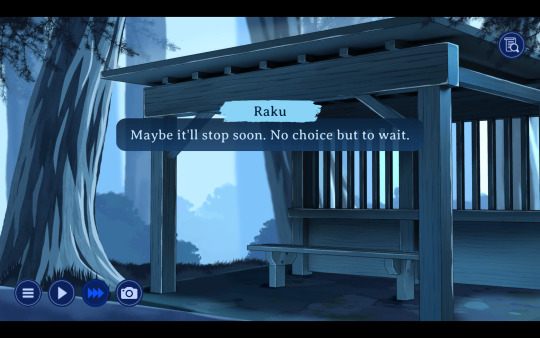

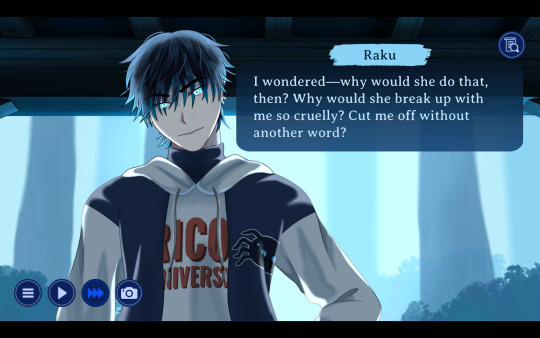
Karamu is a mystery/horror romance where you have an unexpected encounter with your ex-boyfriend. He really wants to discuss the break-up. He probably won't take no for an answer.
The game is complete and takes about an hour to play. It's fully voiced and animated in a comic book style.
Platforms: Windows, MacOS, Android
Karamu also has a Steam page, if you're interested!



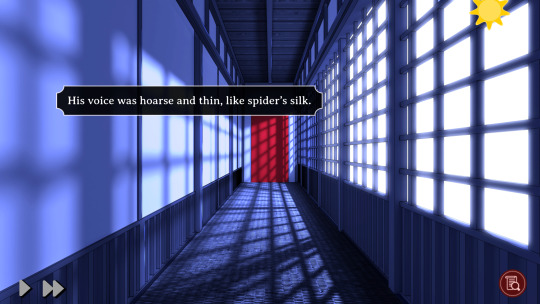

Kanau is a horror/thriller romance that's a direct follow-up and prequel to Karamu. It's about the love interest's childhood and details the start of his obsessions with the main character. (Note: It details heavily with the topic of child abuse.)
The game is complete and takes about an hour to play. It's fully voiced and animated in a comic book style.
Platforms: Windows, MacOS
Games with a Demo



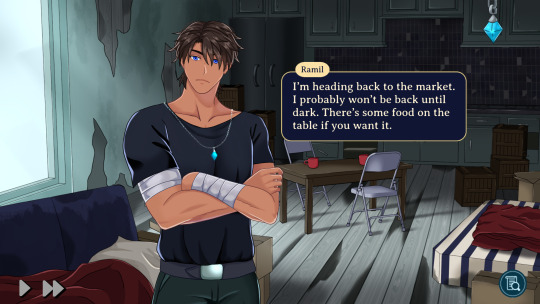

The Deepwater Witch is a post-apocalyptic/supernatural romance retelling The Little Mermaid in a future devastated by climate change, where mermaids have been hunted to near extinction.
The game is currently in development with a 25k word demo (~2-3 hours) released. The full game will be 52k words long and is set to release in April 2024.
Platforms: Windows, MacOS
The Deepwater Witch also has a Steam page, if you're interested!

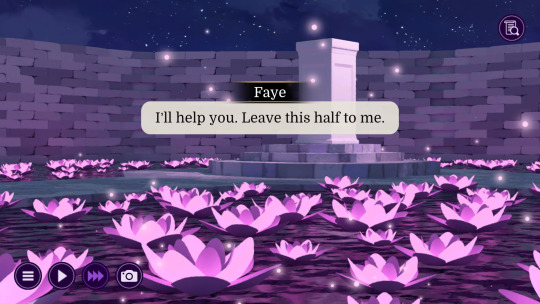



Actala: The Hero's Shadow is a mystery/fantasy romance where you play as the Hero's childhood friend. His journey is finally over, and the kingdom is at peace. But after the "happily ever after," new dangers emerge: dangers that threaten the life of the kingdom's strongest man.
The full game will have 5 love interests and will be over 300k words. There is no set release date due to the scope of the game, but a revamped demo will probably release in Summer 2024.
Games in Current Production
Hanasu is the third installment of the "Karamu" trilogy, following Karamu and Kanau, and it will describe the events a few months after Karamu. The script is complete at 65k words.
TBA. ~4-5 hours, one love interest (F). You're the heir to the royal family, but you've been kidnapped and trapped in a tower by one of the kingdom's strongest knights, who used to be your best friend. Although the kingdom sends knights to rescue you, she cuts them all down without mercy. Why is she doing this? How can you escape? And the question is... do you want to? Key words: Romance, twisted fairy tale, hero-to-villain love interest, tragedy, yandere love interest, customizable protagonist. Currently scriptwriting.
TBA. ~4-5 hours, one love interest (M). Following a horrible family tragedy, you've retreated to a remote island with your loving husband. However, things aren't going well for your marriage. After a horrible fight, you wake up to find that your husband is... different. Kinder. More understanding. At first, you're happy, but he's also acting a bit strangely. You start to wonder... is this the man that you married? Key words: Romance, psychological horror, marriage drama, tragedy, yandere love interest, customizable protagonist. Currently scriptwriting.
Untitled Karamu spinoff. ~4-5 hours, one love interest (M), established protagonist (F). Every three days, a body appears in the harbor, surrounded by red flowers and covered in golden threads, its heart torn out of its chest. People say that it's the work of a demon. After her best friend is beaten half to death by her husband, Nelli decides to do anything to save her - even if it means making a deal with that very same demon. Key words: Romance, smut, historical, revenge, murder spouses, yandere love interest. Currently scriptwriting. (Caution: NSFW)
Additional Links
Itch.io
Twitter/X
Patreon
Website
All other links
36 notes
·
View notes